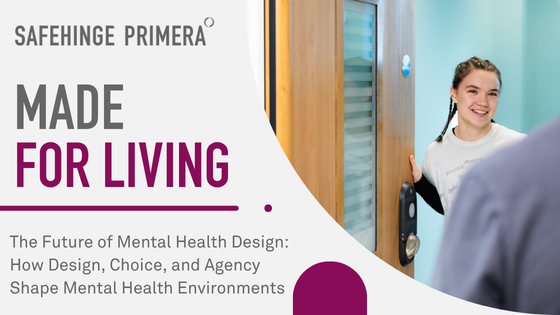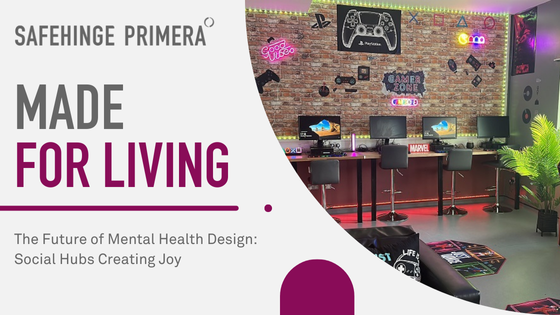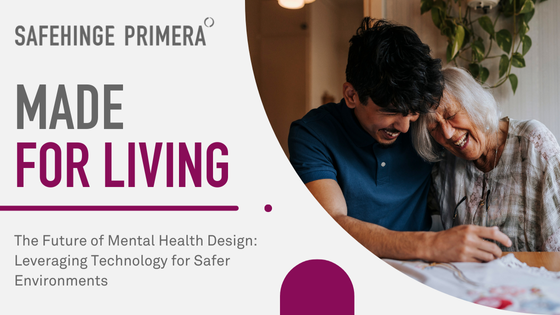Creating safe and dignified environments for patients in mental healthcare settings is a complex challenge. While private en-suite bathrooms enhance patient dignity and independence, they also present unique safety risks. Striking the right balance between privacy and safety requires innovative solutions and thoughtful evaluation processes. This article explores how Cumbria, Northumberland, Tyne and Wear NHS Foundation Trust (CNTW) approached these challenges, highlighting the rigorous process they followed to select anti-ligature en-suite doors that met their exacting standards.
-1.png?width=759&height=427&name=Email%20Header%202%20(2)-1.png)
The Challenge: Managing Risk in En-Suite Environments
The move toward private en-suite bathrooms reflects the mental healthcare sector’s commitment to providing patients with dignity, privacy, and independence. However, these spaces present significant challenges, particularly in high-risk environments such as mental health facilities.
Key Challenges
-
Ligature Risks: En-suite doors can create opportunities for self-harm, posing a major concern in mental healthcare settings.
-
Weaponisation Concerns: Doors might be misused as improvised weapons, endangering patients and staff.
-
Vandalism and Costs: Traditional doors are often damaged, leading to high maintenance and replacement expenses that disrupt operations and strain budgets.
Tony Gray of CNTW NHS Foundation Trust highlighted the dilemma:
"It never made any rational sense... You inherently want to create that environment for patients to feel safe, feel protected, do their normal day-to-day activities with the benefit of an en-suite, and then remove that privacy dignity afforded to them by not having a door."
Balancing these priorities required a solution that met the highest safety standards while fostering dignity and respect for patients.
.png?width=940&height=550&name=En-Suite%20US%20Graphic%20(6).png)
The CNTW Approach: A Rigorous Selection Process
To address these challenges, CNTW NHS Foundation Trust embarked on a meticulous process to identify the most suitable anti-ligature en-suite doors. Their approach emphasised safety, sustainability, and practicality, ensuring the selected solution met their specific needs.
Key Evaluation Criteria
Empower frontline staff with knowledge and skills to identify and respond to potential weaponisation. The ability to properly understand risk relating to weaponisation empowers them to prevent situations from escalating, fosters engagement and allows them to effectively respond to distressed patients when providing inpatient care for Mental Health.
1. Safety First:
- Products underwent destructive testing to ensure ligature resistance, fire safety, and durability.
- Real-world risk scenarios were simulated to validate the effectiveness of the designs.
2. Sustainability:
- Modular designs reduced waste and enabled cost-effective component replacements.
- Durable materials minimised the environmental impact of frequent replacements.
3. Aesthetic Integration:
- Doors were designed to blend seamlessly into therapeutic environments, promoting recovery.
- Biophilic elements and calming colour schemes were incorporated to create soothing spaces.
4. Vendor Credibility:
- Vendors were evaluated on their track record, experience, and ability to handle large-scale installations.
- Safehinge Primera’s established expertise made them a strong candidate.
Tony Gray underscored the importance of vendor credibility:
"The track record of the company, lead times, their experience of fitting, had they done it before? No disrespect, some of them were effectively one-person operations with a door under their arm trying to tender for the business."
Implementation: From Testing to Full Deployment
The selection and rollout of anti-ligature en-suite doors at CNTW NHS Foundation Trust followed a structured, multi-phase process.
1. Comprehensive Evaluation
CNTW NHS Foundation Trust used a detailed 0–5 rating system to assess potential solutions. Quality and safety were prioritised, with vendors required to submit prototypes for rigorous testing. Key criteria included:
- Ligature resistance
- Fire safety
- Vandalism resistance
Tony Gray explained the value of destructive testing:
"We did destructive tests on the doors... thinking about fire safety, ligature reduction, vandal resistance, and how the doors could blend into existing environments."
2. Pilot Programme
A trial was conducted on two wards to validate the doors’ performance in real-world settings. This allowed CNTW to:
- Gather feedback from staff and patients.
- Identify areas for improvement.
- Ensure scalability and adaptability to different ward layouts.
3. Full Deployment
Following the successful pilot, the selected anti-ligature en-suite doors were installed across multiple wards. Staff received comprehensive training to ensure proper usage and maintenance, reinforcing the importance of ongoing education in maximising safety.
Outcomes: Transforming Safety and Dignity
The rigorous selection process undertaken by Cumbria, Northumberland, Tyne and Wear NHS Foundation Trust (CNTW) has resulted in significant improvements across key areas.
Enhanced Safety: Ligature risks were reduced by over 95%, addressing a critical safety concern in mental healthcare, while no incidents of weaponisation were reported, dispelling common myths.
Tony Gray emphasised the role of data-driven validation, stating, “We’ve always been quite a practical organisation and use data to evidence... Once you can trust that data, you can then use that to bypass all of the anecdotal stuff.”
Improved Patient Dignity: Patients reported feeling safer and more respected in private spaces, with staff observing positive behavioural changes such as reduced anxiety and increased trust.
Cost Efficiency: Modular designs contributed to a 30% reduction in maintenance costs, while minimal disruptions ensured continuity of care and reduced downtime.
Increased Staff Confidence: Comprehensive training equipped staff to fully utilise the benefits of the new doors, fostering confidence in the solution and enhancing overall trust in the system.
Lessons for the Sector
The experience of Cumbria, Northumberland, Tyne and Wear NHS Foundation Trust (CNTW) provides valuable lessons for organisations aiming to improve safety and dignity in mental healthcare settings.
Rigorous Testing: Conducting destructive testing ensures that solutions meet the highest standards of safety and reliability before implementation, mitigating risks and fostering confidence among stakeholders.
Stakeholder Engagement: Actively involving staff and patients in the evaluation process delivers essential feedback that drives meaningful design improvements.
Continuous Improvement: Establishing iterative feedback loops enables organisations to refine and adapt solutions over time, ensuring they meet evolving demands and requirements.
Data-Driven Decisions: Transparent reporting systems support evidence-based decision-making, minimising reliance on anecdotal concerns and promoting objective, effective solutions.
Future Directions
CNTW NHS Foundation Trust is focused on driving innovation and improving mental healthcare environments. By utilising artificial intelligence and predictive analytics, the Trust aims to analyse patient behaviour and identify potential incidents, allowing for proactive safety measures. Efforts are also being made to extend anti-ligature solutions to high-risk areas such as shared bathrooms and communal spaces, ensuring safety across all facilities. Additionally, CNTW is committed to sustainability, developing environmentally conscious designs that reduce ecological impact while enhancing durability and cost-effectiveness.
Tony Gray summarised the importance of forward-thinking design:
"The challenge for suppliers is to listen, learn, and take the experience of patients. As we reduce risks in bedrooms, the focus naturally shifts to other spaces like bathrooms."
Additional Considerations for the Future
The future of designing safe and reliable mental health environments lies in leveraging emerging technologies, expanding stakeholder collaboration, and adopting holistic design approaches. Integrating smart monitoring systems with IoT-enabled sensors can provide real-time alerts on tampering or unusual activity, enhancing safety and response times. Virtual reality (VR) offers an innovative way to train staff through simulations, equipping them to effectively handle potential safety incidents in en-suite spaces.
Collaboration with patient advocacy groups is crucial to ensure lived experiences shape product design, while interdisciplinary teams of architects, clinicians, and safety experts contribute to comprehensive, well-rounded solutions during early-stage development.
A holistic approach to design focuses on creating integrated patient environments where en-suite safety solutions align seamlessly with innovations in bedroom furniture, lighting, and security measures. Flexible modular designs further enable adaptability to evolving healthcare needs while maintaining the highest safety standards.
Conclusion
CNTW NHS Foundation Trust’s rigorous approach to selecting anti-ligature en-suite doors demonstrates the importance of a thoughtful and evidence-based evaluation process in addressing safety and dignity in mental healthcare. By prioritising patient-centred solutions and involving stakeholders throughout, CNTW has set a benchmark for the sector.
The success of this initiative underscores the value of collaboration, innovation, and continuous improvement. As other facilities seek to enhance their environments, CNTW’s experience offers a valuable model for balancing privacy, safety, and sustainability.
Interested in learning more? Contact us to discuss how Safehinge Primera’s solutions can support your organisation’s goals.
Contact us to learn more about how our solutions contribute to safer Behavioral Health environments.





